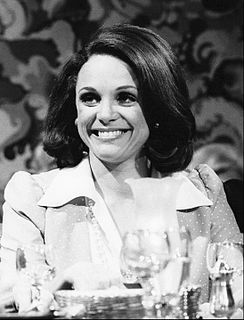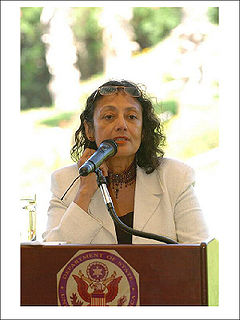A Quote by Valerie Harper
I heard that someone asked Mother Teresa what was most important in her work. I thought she'd say the Rosary but she said, 'My nuns and I take very good care of ourselves so we can tend to the lepers and do whatever we need to assist.' If you're strong, or at least not hurting, you can inspire others.
Related Quotes
I think, when I started to become successful in the movie business, my mother was very, very worried. She thought no one would want to marry me and she thought that was the most important thing. And she thought that it would affect my personal relations. And she said how worried she was that people would take advantage of me or I would meet the wrong people. When I was made head of the studio, one of her first things was, "Well, now no one will marry you. I hope you'll be happy, whatever."
Mother Teresa was a hero of mine for a long time. I just like the way she took on the world from a very humble place. She has a great quote. When she was leaving her monestary to start Sisters of Charity, she had two pennies. She was asked by a head priest what she could possibly do with two pennies. She said, 'Nothing. But with two pennies and God, I can do anything'.
She didn’t understand why it was happening,” he said. “I had to tell her she would die. Her social worker said I had to tell her. I had to tell her she would die, so I told her she was going to heaven. She asked if I would be there, and I said that I would not, not yet. But eventually, she said, and I promised that yes, of course, very soon. And I told her that in the meantime we had great family up there that would take care of her. And she asked me when I would be there, and I told her soon. Twenty-two years ago.
Mother Teresa's detractors have accused her of overemphasizing Calcuttans' destitution and of coercing conversion from the defenseless. In the context of lost causes, Mother Teresa took on battles she knew she could win. Taken together, it seems to me, the criticisms of her work do not undermine or topple her overall achievement.
A lot of people say that Eleanor Roosevelt wasn't a good mother. And there are two pieces to that story. One is, when they were very young, she was not a good mother. She was an unhappy mother. She was an unhappy wife. She had never known what it was to be a good mother. She didn't have a good mother of her own. And so there's a kind of parenting that doesn't happen.
The Olinka girls do not believe girls should be educated. When I asked a mother why she thought this, she said: A girl is nothing to herself; only to her husband can she become something. What can she become? I asked. Why, she said, the mother of his children. But I am not the mother of anybody's children, I said, and I am something.
The picture of Mother Teresa that I remember from my childhood is of a short, sari-wearing woman scurrying down a red gravel path between manicured lawns. She would have in tow one or two slower-footed, sari-clad young Indian nuns. We thought her a freak. Probably we'd picked up on unvoiced opinions of our Loreto nuns.
The picture of Mother Teresa that I remember from my childhood is of a short, sari-wearing woman scurrying down a red gravel path between manicured lawns. She would have in tow one or two slower-footed, sari-clad young Indian nuns. We thought her a freak. Probably wed picked up on unvoiced opinions of our Loreto nuns.
Sometimes we adopt certain beliefs when we're children and use them automatically when we become adults, without ever checking them out against reality. This brings to mind the story of the woman who always cut off the end of the turkey when she put it in the oven. Her daughter asked her why, and her mother responded, "I don't know. My mother always did it." Then she went and asked her mother, who said, "I don't know. My mother always did it." The she went and asked her grandmother, who said, "The oven wasn't big enough."
He lifed his head and looked down at her seriously. "Could you," he began, then he had to clear his throat. "Could you learn to be fond of me?" he asked. "With enough time?" She looked at him in surprise. It was the first time in all their acquaintance that she'd heard him sound the least bit hesitant. "I don't need to learn anything," she said, before she thought better of it.
[Short Talk on Sylvia Plath] Did you see her mother on television? She said plain, burned things. She said I thought it an excellent poem but it hurt me. She did not say jungle fear. She did not say jungle hatred wild jungle weeping chop it back chop it. She said self-government she said end of the road. She did not say humming in the middle of the air what you came for chop.
That's what I do. I just let Mother Earth use me, in many, many instances, especially when I am working with pollution. She is a very real Spirit - she is your mother, and if you open to Her, she can come in and use you in a way that is very powerful. That is what Mother Teresa has done, by being selfless.

































